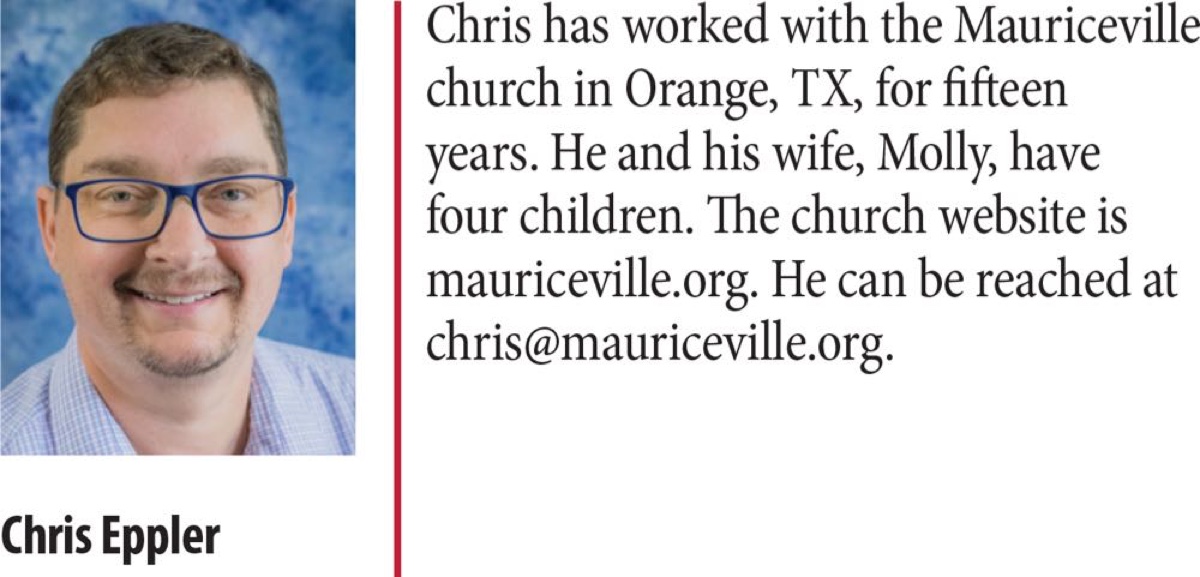By Chris Eppler
Synopsis: While it is a challenge to help the “churched” see the need for change, there are some simple ways we can alter our approach to be more effective.
We are charged with preaching the gospel to the lost (Mark 16:15-16). The New Testament certainly equips us to do such as it does for any command that the Lord has given us to perform (2 Tim. 3:16-17). While this is certainly true, flexibility through generic command has been built into the New Testament, so we can take that same gospel message to the ever-evolving cultures that saints in different times and places encounter. The culture that we work with today is radically different from the culture of the New Testament in nearly every imaginable way, yet the same gospel has the power to bring all humanity into Christ, regardless of culture or point in time.
One tragic way that culture is different today is the religious division that has multiplied over the centuries amongst those that name the name of Christ. Sadly, many will be lost because of this division. Thus, we find ourselves in the position of trying to reach those that already know of Christ, but have been trained in ways that are foreign to His word and will likely lead to their being eternally lost.
What are some considerations that will help us more effectively reach these “churched” individuals?
It is easy to despair in such situations. We have friends and family who are in this precarious position and it is very difficult to help a spiritual person see the problems with what they are doing. Yet we must not despair. The “churched” can be reached by the gospel of Jesus Christ, just as with any other individual.
We never want to exhibit a lack of faith in the word of God. As God pointed out to Isaiah, His word will not return to Him empty, but will accomplish exactly what He desires (Isa. 55:11). We must simply persist in teaching as long as an individual will listen and leave the increase up to the Lord. “Churched” individuals are being won the world over every single day.
The conversion accounts in the book of Acts are clear that the message was tailored to what the audience needed. In Acts 2, Peter is addressing a large group of Jews that were familiar with the Law and the Prophets. Therefore, when he addresses them, he does so through prophecies with which they would be familiar, and then calls upon them to repent and be baptized. In one sense, faith was hardly a consideration for these individuals. They already believed in the one true God. They simply needed it demonstrated to them that Jesus was the fulfillment of the prophecies given by the Father. They needed to believe and obey Jesus Christ.
In Acts 17, Paul addresses the individuals in Athens, and he does so in a completely different way. The entirety of the written word and the story of the cross were entirely foreign to them. To them, he was a “proclaimer of strange deities.” When Paul addresses these philosophers, he does so through several means. He speaks to them using a starting point of one of their own idols. He then points out the inability of an idol to do anything, a truth that is self-evident, especially by these wise men to whom he speaks. He even alludes to words from their own poets to help them understand. Finally, he calls them to repentance. His method is very different on this occasion, but it was tailored to those to whom he was speaking.
Many times we talk past people. Either we do not truly consider where they presently are spiritually, or where they are coming from, or we simply address them based on pre-suppositions about what they believe. We need to take the time to figure out where the “churched” individual really is. While we may have a general understanding of the teachings of various religious groups, there is significant variation amongst such groups, even those that wear the same name. Therefore, we should never take for granted that we know where a “churched” prospect is.
When we are talking to a “churched” individual, we are speaking with a person who loves the Lord. We are speaking with a seeker. We are speaking with someone that through the Lord’s providence is now sitting in front of us to learn from us. Whatever this person has done in their life up to this point, physically and spiritually, has brought them to this moment. That is an honorable thing, and it is a great responsibility of stewardship entrusted to us by the Lord!
It is far too easy to lose sight of this. It is far too easy to approach the person with superiority. It is far too easy to turn the person off because of our attitude. We must have a genuine respect for the individual and what has led them to this point. As was the case of Aquila and Priscilla of old, we are simply teaching them the way more perfectly (Acts 18). Sometimes it is a matter of the “churched” individual simply not having all the information, such as with Apollos. Sometimes it is a matter of teaching truths that are in opposition to what someone knows and believes, whether acquired from his religious affiliation or through errant personal study. Regardless, we must patiently approach our task of teaching, manifesting genuine respect for the individual, recognizing where his spiritual efforts have brought him, and encouraging his willingness to study further.
When we are sitting down with someone who is “churched” but in error, we are talking with someone that needs to hear the saving message of Jesus Christ. Of first importance is that Jesus came to this earth, God in the flesh, lived the life of a bondservant, was crucified by His own people, rose on the third day, ascended on high, and left baptism for us as the way to come into contact with this work of His and begin life anew. How tragic to squander the opportunity to share this life-saving message (that very well may be the first time they have fully heard it) by speaking about things that, though important, are not the most important in the moment.
Too often we get bogged down in trying to talk someone out of various positions when what needs to be done is simply to preach the simple gospel and how to respond to it. We get derailed by random thoughts of the individual and chase proverbial rabbit trails. Before we know it, we have lost their attention, lost the opportunity, or even worse, angered them over something that would have best been addressed in a later study after their initial response. It is clear from previously mentioned passages in Acts that the Spirit, through men like Peter and Paul, approached people with a plan in mind for what was fitting in the moment. We need to approach “churched” individuals with a tailored teaching plan and stick with it.
There is certainly hope for the “churched.” If we will simply trust in the word’s effectiveness, evaluate and meet people where they are, approach them from a place of respect, and then stick to what needs to be taught in the moment, we will find much greater success in helping the “churched” to see the way. May the Lord give us open doors and may we take advantage of them to the fullest (Col. 4:2-4)!


